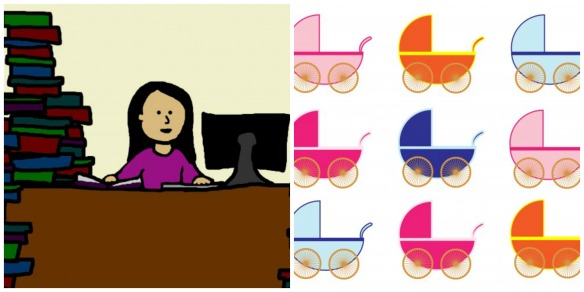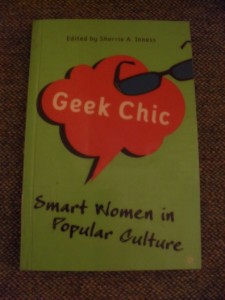#AdviceForYoungJournalists was trending on Twitter this morning and a spinoff hashtag, #AdviceForYoungAcademics, started. It reminded me that the idea for this post has been brewing in my brain for a while, but I haven’t found the time to blog since early January: a partial explanation for my hiatus is the beginning of the Spring term and the deluge of reading, writing and class-attending that it entailed. The other reason is that I spent two weeks in a coffee haze, writing a research proposal to apply for grant funding for my MA and Ph.D. On Friday, I heard that I have been officially accepted for a Master’s degree, to be followed by a Ph.D. This is very exciting! Now I have to wait a couple of months before I hear about whether I am awarded the funding. The grant is competitive and there is one place available. In the meantime, I don’t have much time to think/worry about it, because I have 9,000 words to write over the next few weeks.
Regular Cultural Life readers will know how much I am enamored by academia, which brings me to the point of this post. Before Christmas, I checked out Geek Chic: Smart Women in Popular Culture, edited by Sherrie A. Inness, from my university library. Although it isn’t related to my academic field of linguistics, the title attracted me because I have an interest in how smart women are portrayed. Also: yes, I read academic books for fun. I checked this book out during winter break, so I think that probably makes me a nerd by default.
Geek Chic is a collection of chapters about the portrayal of intelligent women in popular culture and the media. This includes fictional women, such as “Beauty and the Geek: Changing Gender Stereotypes on the Gilmore Girls” by Karin E. Westman, and real-life women, such as, “Heckling Hillary: Jokes, Late Night Television, and Hillary Rodham Clinton” by Jeannie Banks Thomas. I didn’t read the book from cover-to-cover, instead I picked out the chapters that were most interesting to me. That’s one of the great things about an academic anthology of different chapters: you can pick and choose the parts that are the most interesting and relevant.
I particularly enjoyed the chapter by Leigh H. Edwards, entitled “Dangerous Minds: The Woman Professor on Television”. Edwards writes about how women in academic careers are portrayed on screen in the dramas Jack and Bobby and The Education of Max Bickford. Unsurprisingly, the dramas portray female academics who achieve success in their professional lives, but at the same time they are “condemned for how they depart from traditional gender roles in their private lives” (Edwards, 2007: 122). Edwards’s chapter highlights the “continuing structural inequities for women in higher education” and the fact that many female graduates “[jump] off their career track to be stay-at-home mothers”. Note that Edwards is not judging women who choose that path, she is highlighting the problems and issues that many women face in their careers. This is an ongoing issue, as posts on the excellent Tenure, She Wrote blog show.
I am surrounded by intelligent, academic women in my university department and I respect them greatly for their knowledge and enthusiasm. I am at the beginning of my academic career and I am fortunate in that sexism directed at smart women isn’t something that I have personally encountered, although I know it exists. Just yesterday I read a chapter by Louise Mullany entitled “Gendered Identities in the Professional workplace: Negotiating the Glass Ceiling”, which is about how language can be used to reinforce and spread gender stereotypes in the business world. Mullany (2010: 183-4) cites Kanter’s (1977) four categorizations of gender identities that are often imposed on women in business: the ‘mother role’ (i.e., “stereotypically feminine”), the ‘iron maiden’ (“characterised […] by the performance of masculine speech styles”), the ‘seductress’ and the ‘pet’. If a woman tries to fulfill both feminine and masculine roles, it can result in a “double bind” (ibid.). This, to me, speaks volumes about how the media widely portrays women as unable to fulfill dual roles: duality is frowned upon.
Judgments are commonplace – I have heard them even within my family – about women who decide to fulfill dual roles. It seems to me that women are subject to more judgments about their choices in their personal lives and the chapter by Edwards in Geek Chic describes how the dramas she discussed portray a “dynamic in which women must excel in their career but replicate the nurturer-caregiver role at home, part and parcel of an effort to ‘have it all'” (Edwards, 2010: 124). These shows, and popular culture in general, rarely show women who pursue a professional career and a private life, without resorting to drug use or having their marriages fall apart. Rather than depictions of ‘mommy wars’ and judgments designed to induce guilt in working mothers, I’d rather read about professional women who manage just fine. As a post from Tenure, She Wrote aptly says: Daycare is not a bad word!

Public domain images source: Woman Studying and Baby Carriage clipart
I am a young, aspiring academic; therefore, I guess I’m not best qualified to give advice. But I think it’s always good to reflect on your experiences, however old you are. A few of the things I’ve learned so far are:
1) Doing your own research and conducting fieldwork is a wonderful thing.
2) Hard work does pay off. When I look at my post in October, I was starting out on a project and felt somewhat downcast at the time. A few months later: I finished the project, which was very rewarding, and achieved an excellent grade.
3) Always be engaged. If something bores you, look at it from another angle and find what is interesting about it.
4) Prioritize! Start your most important papers/projects/essays etc. early. I like to start early and brainstorm, as it allows time for ideas to percolate.
5) Find your rhythm: when do you work best? For me, it’s the early morning, so I do more intellectually taxing work in those precious hours between 7 – 10 am.
6) Be determined! Everyone doubts themselves sometimes: it’s not a weakness.
Do you have advice for young academics? What do you think about the stereotypes and categorizations that are frequently imposed on professional women?
The references for the books which contain the chapters mentioned in my post are:
Inness, S. A. (2007). Geek Chic: Smart Women in Popular Culture. New York: Palgrave Macmillan.
Llamas, C. and Watt, D. (2010). Language and Identities. Edinburgh: Edinburgh University Press.

